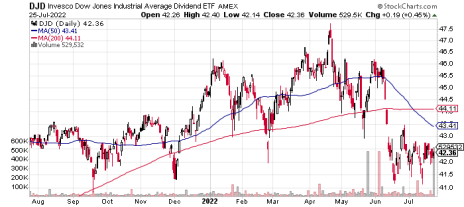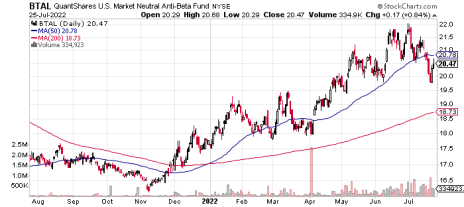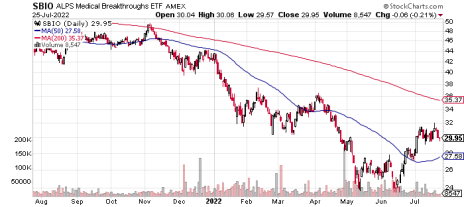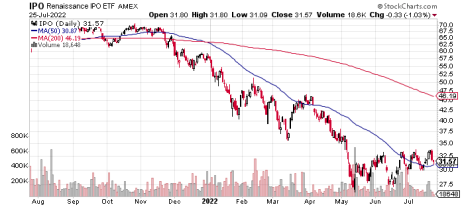Note to subscribers: This is your regular weekly update for the ETF Strategist newsletter. This is NOT a buy or sell alert. We have not made any portfolio changes since the most recent issue, dated July 12.
For the current allocations, please refer to that issue, and feel free to contact me directly at kate@cabotwealth.com with any questions.
Update
A sudden surge in the U.S. dollar over the past year has bought good and relatively bad news for some firms. With the dollar strengthening, American companies with significant imports have benefitted from cheaper foreign exchange trade. Meanwhile, companies with a more global business are suffering because the strong dollar is affecting their performance.
On July 18, International Business Machines (IBM) released better-than-expected earnings, with revenue rising by 9% year-over-year to $15.5 billion. However, despite posting high gains, IBM was down around 7% the next day as the company warned of a $3.5 billion foreign exchange hit.
Why is that important for ETF investors?
Because that news puts ETFs with the highest allocation in tech giants in the spotlight. And our DJD holding is among those ETFs…
Invesco Dow Jones Industrial Average Dividend ETF (DJD)
DJD tracks an index comprised of dividend-paying securities of the companies listed in the Dow Jones Industrial Average. This ETF has a total holding of 28 stocks, and is weighted by average dividend yield. With IBM having the highest weighting in this ETF, around 8.5%, DJD has moved down more than half a percentage point since IBM’s earnings report.
AGFIQ U.S. Market Anti Beta Fund (BTAL)
This fund has the potential to generate positive returns regardless of the market’s direction, as long as low-beta stocks outperform the high-beta stocks.
As a quick refresher, this ETF invests primarily in long positions in low-beta U.S. equities, meaning those that are theoretically less volatile than the broader market. Simultaneously, the fund takes short positions in high-beta U.S. stocks, on a dollar-neutral basis within sectors.
What is dollar neutral? That means the manager holds both long and short positions on the same underlying investment thesis, but using slightly different securities or instruments. For example, the difference could be options of the same underlying asset, or using a long-short strategy, as this ETF does.
According to fund literature, BTAL aims to “provide consistent negative beta exposure and can be used as an effective equity hedge to lower portfolio volatility and reduce the impact of drawdowns. It may be an effective alternative to buying Treasuries, volatility products and low-volatility funds if seeking to reduce overall portfolio risk.”
In other words, you’re looking at a replacement for low-yielding Treasuries.
In the event that the economy slows significantly, as we’re starting to see from earnings reports and economic indicators, the Fed may have to slow its rate hike plans.
In that scenario, keeping BTAL in the portfolio is a good option. The fund has a YTD return of 13.16%.
ALPS Medical Breakthroughs ETF (SBIO)
This fund tracks an index of U.S.-listed biotech companies whose drugs are currently in either Phase II or Phase III FDA clinical trials.
As per ALPS, SBIO’s cancer segment was the best performer in June; within this segment, Day One Biopharmaceuticals (DAWN), which constitutes 0.65% of current holdings, advanced 187% in June. Meanwhile, Iovance Biotherapeutics (IOVA), at 1.11% of current holdings, gained 63.56% on news of insider purchasing, which can be an indication of confidence among those in the know.
The SBIO ETF is 22.64% up from its price on June 1 and 5.52% up since we bought it.
Renaissance IPO ETF(IPO)
This ETF offers access to the newest publicly traded stocks. It adds a new company to its basket within 90 days of listing and removes a firm after two years of public trading.
The total number of holdings is 100, with its biggest holding in Airbnb (ABNB) at 8.77%, followed by Snowflake (SNOW) at 6.68%. This ETF has moved down 1.27% since the day we purchased it, although it’s rallied in tandem with the broader market in the past week.
| Undiscovered | Symbol | Allocation | Date Bought | Price Bought | Price on 7/25/22 | Dividends | Div Freq. | Dividend Announced | Total Return |
| Invesco Dow Jones Industrial Average Dividend ETF | DJD | 40% | 4/8/22 | 46.35 | 42.17 | 0.32 | Quarterly | 6/21/2022 | -8.32% |
| AGFiQ US Market Neutral Anti-Beta Fund | BTAL | 30% | 4/26/22 | 19.86 | 20.30 | 0.00 | - | 2.22% | |
| ALPS Medical Breakthroughs ETF | SBIO | 20% | 6/27/22 | 28.44 | 30.01 | 0.00 | Quarterly | 5.52% | |
| Renaissance IPO ETF | IPO | 10% | 7/8/22 | 32.31 | 31.90 | 0.00 | Quarterly | -1.27% |



